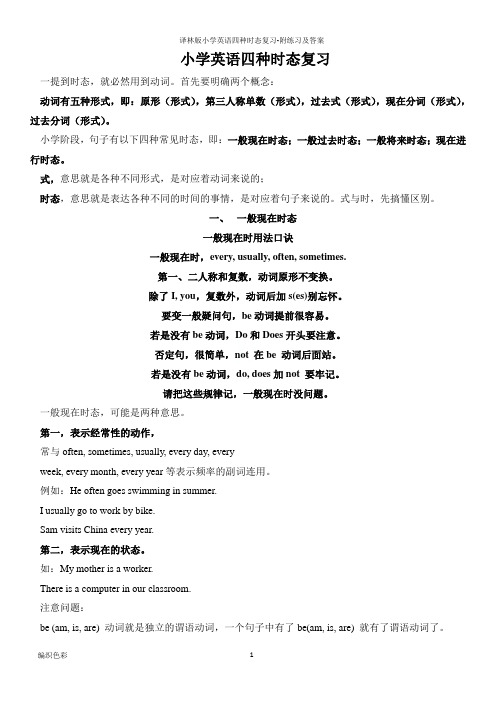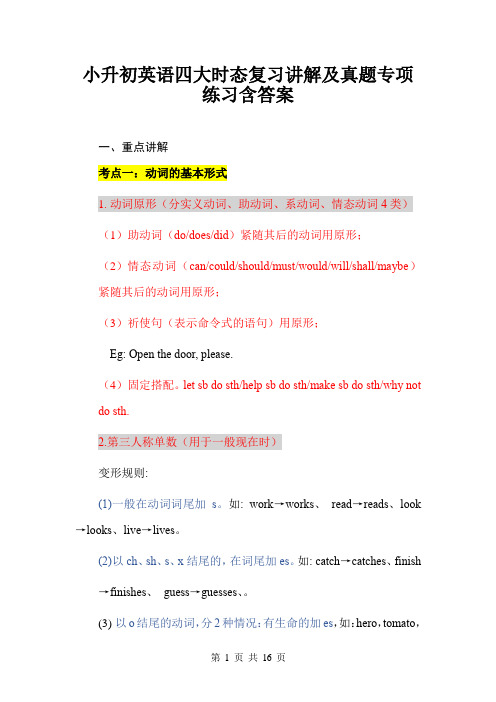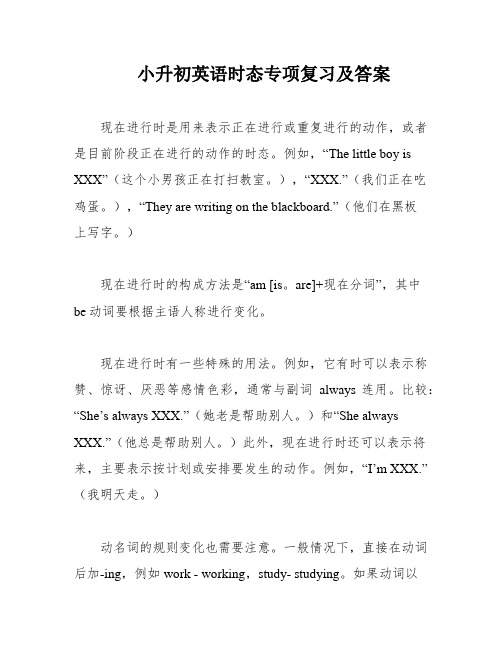小学英语四大时态总结附小升初时态考题
六年级下册英语素材-小升初英语四大时态复习 全国通用

A.一般现在时一、 时间标志词有:always> usually >often >sometimes >neverevery day/week/month/year三、1.一般情况下,直接加-s ,如:cook-cooks, milk-milks2.以s. x. sh. ch. o 结尾,加-es ,如:wash-washes, watch-watches, go-goes3.以“辅音字母(元音字母aeiou 除外)+y”结尾,变y 为i, 再加-es ,如:study-studies辅助练习一:写出下列动词の第三人称单数二:用所给动词の适当形式填空I _______(be) ill today. I don ’t ______(go) to school.My mother ______(take)me to the hospital.The doctor _________(ask) me to have a rest.So I must_______(stay) in bed.B.现在进行时一、时间标志词有:now, Listen! Look!现在进行时构成主语+三、*动词加ing の变化规则1.一般情况下,直接加ing ,如:cook-cooking2.以一个不发音のe 结尾,去e 加ing ,如:make-making,take-taking3.末尾是“辅元辅”结构の重读闭音节,先双写末尾の辅音字母,再加ing ,如:run-running, stop-stopping ,swim-swimming, get-getting,begin-beginning 辅助练习二、用所给词の正确形式填空It's 5 o'clock now. Look at the boys!They are___________ ( play) football on the playground now. But Tom and Jerry _____________(clean) the room.Listen !Some girls _______________ ( sing)in the classroom .Some teachers are __________(read) books. Guess,what is Mr Gao _________(do) ?C.一般将来时一、时间标志词有:tomorrow,tomorrow morning(evening,afternoon),next day(week, month, year,Monday),in+一段时间,this morning (afternoon , evening,)等。
译林版小学英语四种时态复习-附练习及答案

小学英语四种时态复习一提到时态,就必然用到动词。
首先要明确两个概念:动词有五种形式,即:原形(形式),第三人称单数(形式),过去式(形式),现在分词(形式),过去分词(形式)。
小学阶段,句子有以下四种常见时态,即:一般现在时态;一般过去时态;一般将来时态;现在进行时态。
式,意思就是各种不同形式,是对应着动词来说的;时态,意思就是表达各种不同的时间的事情,是对应着句子来说的。
式与时,先搞懂区别。
一、一般现在时态一般现在时用法口诀一般现在时,every, usually, often, sometimes.第一、二人称和复数,动词原形不变换。
除了I, you,复数外,动词后加s(es)别忘怀。
要变一般疑问句,be动词提前很容易。
若是没有be动词,Do和Does开头要注意。
否定句,很简单,not 在be 动词后面站。
若是没有be动词,do, does加not 要牢记。
请把这些规律记,一般现在时没问题。
一般现在时态,可能是两种意思。
第一,表示经常性的动作,常与often, sometimes, usually, every day, everyweek, every month, every year等表示频率的副词连用。
例如:He often goes swimming in summer.I usually go to work by bike.Sam visits China every year.第二,表示现在的状态。
如:My mother is a worker.There is a computer in our classroom.注意问题:be (am, is, are) 动词就是独立的谓语动词,一个句子中有了be(am, is, are) 就有了谓语动词了。
句子中不能同时出现两个谓语动词。
不少同学经常出这样的错误:The boy is often eats hamburgers.(错)应当改为:The boy often eats hamburgers.二、现在进行时态正在进行时态口诀现在分词用途多,进行时态不用说。
小升初英语四大时态复习讲解及真题专项练习含答案

小升初英语四大时态复习讲解及真题专项练习含答案一、重点讲解考点一:动词的基本形式1.动词原形(分实义动词、助动词、系动词、情态动词4类)(1)助动词(do/does/did)紧随其后的动词用原形;(2)情态动词(can/could/should/must/would/will/shall/maybe)紧随其后的动词用原形;(3)祈使句(表示命令式的语句)用原形;Eg: Open the door, please.(4)固定搭配。
let sb do sth/help sb do sth/make sb do sth/why not do sth.2.第三人称单数(用于一般现在时)变形规则:(1)一般在动词词尾加s。
如: work→works、read→reads、look →looks、live→lives。
(2)以ch、sh、s、x结尾的,在词尾加es。
如: catch→catches、finish→finishes、guess→guesses、。
(3)以o结尾的动词,分2种情况:有生命的加es,如:hero,tomato,potato;没有生命的加s,如:radio,photo。
(4)以辅音字母加y结尾的动词,变y为ies。
如: fly→flies、study →studies、carry→carries.(5) 不规则变化。
如: have→has ,are→is,were→was3.现在分词(用于现在进行时)变形规则:(1)一般在动词后加ing。
如: work→working、read→reading、look →looking、wait→waiting。
(2)以不发音的e结尾的动词,去掉e,再加ing。
如: smile→smiling、move→moving、take→taking、write→writing。
(3)以重读闭音节结尾的且词尾只有一个辅音字母的,双写这个辅音字母加ing。
如: sit→sitting、stop→stopping、cut→cutting、run →running、swim→swimming.(4)少数几个以ie结尾的动词,将ie改为y加ing。
小学英语四大时态总结(附小升初时态考题)

4. 以o结尾的单词: 有生命加s 。
tomato-tomatoespotato-potatoes无生命加espiano-pianosphoto-photoszoo-zoosradio-radios小升初时态专题综合训练1.(成都市青羊区小学毕业卷)John _____ football.A. likes playingB. likes playC. like play2.(深圳市龙岗区小学毕业卷)Does your mother _____ football?A. likeB. likesC. like play3.(芜湖市第三中学招生卷)They usually _____ TV in the evening.A. watchB. will watchC. are watchingD. watches4.(上海市奉贤区小学毕业卷)—What do you usually do on the weekend?—I often ____.A. do my homeworkB. did my homeworkC. doing my homework5. (杭州市西湖区小学毕业卷)I don’t like _____ thril lers(恐怖片)______ playing baseball.A. watching; orB. watching; andC. to watch; or6.(菏泽市晨曦中学招生卷)Bob often _____ to school.A. walkB. walksC. walked7.(南昌铁路一中初中部招生卷)My pen ______ on my desk ten minutes ago.But it _____ there now.A. is; isn’tB. was; isn’tC. is; is8.(长沙市宁乡县小学毕业卷)Mike is _____ after his classmates.A. runsB. runingC. running9.(桂林市奎光学校招生卷)Be quiet! The babies ________.A. sleepB. are sleepingC. slept10. (武汉市青山区小学毕业卷)______ he _____ his homework yesterday?A. Does; doB. Did; didC. Did; do11(北京市朝阳区小学毕业卷)—What did you do last weekend?—I ______.A. go swimmingB. did my homeworkC. went swim12.(芜湖市第十一中学招生卷)—What’s your hobby?—_____ is my hobby.A. Collecting stampsB. Collect stampsC. Stamps13.(广州市白云区小学毕业卷)—Where were you just now?—I _____ at school.A. isB. wasC. were14.(武汉市青山区小学毕业卷)______ he ______ his grandparents lastmonth?A. Did; visitedB. Did; visitC. Do; visited15.(郑州市二七区小学毕业卷)Last week, we _____ a _____ race.A. hard; runningB. have; runningC. had; running16.(福州市仓山区小学毕业卷)I______ to the park last week.A. goB. wentC. going17.(合肥市蜀山区小学毕业卷)If I _____ you tomorrow, I will give youthe receipt(收据)。
小升初英语时态专项复习及答案

小升初英语时态专项复习及答案现在进行时是用来表示正在进行或重复进行的动作,或者是目前阶段正在进行的动作的时态。
例如,“The little boy is XXX”(这个小男孩正在打扫教室。
),“XXX.”(我们正在吃鸡蛋。
),“They are writing on the blackboard.”(他们在黑板上写字。
)现在进行时的构成方法是“am [is。
are]+现在分词”,其中be动词要根据主语人称进行变化。
现在进行时有一些特殊的用法。
例如,它有时可以表示称赞、惊讶、厌恶等感情色彩,通常与副词always连用。
比较:“She’s always XXX.”(她老是帮助别人。
)和“She always XXX.”(他总是帮助别人。
)此外,现在进行时还可以表示将来,主要表示按计划或安排要发生的动作。
例如,“I’m XXX.”(我明天走。
)动名词的规则变化也需要注意。
一般情况下,直接在动词后加-ing,例如work - working,study- studying。
如果动词以不发音的-e结尾,要去-e加-ing,例如take- taking,make-making。
对于重读闭音节的动词,若末尾只有一个辅音字母,要双写辅音字母,再加-ing,例如cut - cutting,put -putting。
以-ie结尾的动词要把变成y再加-ing,例如lie-lying,die - dying。
现在进行时的真题再现包括“Look!XXX XXX.”(瞧,孩子们正在踢足球。
)和“Look。
XXX XXX down from the tree.”(瞧,小熊猫正在从树上下来。
)1.XXX is XXX.2.I am watching TV right now.3.She is working in a hospital.4.Kitty and Ben are having XXX XXX.5.His father is able to help them.6."Danny。
小学四年级英语知识点和英语语法总结及小学英语四大时态总结(附小升初时态考题)

小学四年级英语知识点总结英语语法总结一、名词复数规则1. 一般情况,直接加-s,如:book-books, bag-bags, cat-cats2. 以s. x. sh. ch结尾,加-es,如:bus-buses, box-boxes, watch-watches(手表)3. 以“辅音字母+y”结尾,变y为i, 再加-es,如:family-families, strawberry-strawberries 但boy-boys4. 以“f或fe”结尾,变f或fe为v, 再加-es,如:knife-knives leaf-leaves5. 以o结尾有生命的加es 无生命的加s,如:potato-potatoes tomatoes photo-photos piano-pianos不规则名词的复数:man-men, woman-women, policeman-policemen, policewoman-policewomen, child-children, foot-feet, tooth-teeth, fish-fish, people-people, Chinese-Chinese, goose-geese不可数名词没有复数形式:paper, juice, water, milk, rice, tea在具体句子中我们应该把不可数名词当成单数看待二、一般现在时一般现在时的功能1.表示事物或人物的特征、状态。
如:The sky is blue.天空是蓝色的。
2.表示经常性或习惯性的动作。
如:I get up at six every day.我每天六点起床。
3.表示客观现实。
如:The earth goes around the sun.地球绕着太阳转。
一般现在时的标志词:often, usually, sometimes, every等一般现在时的构成主语+动词原形。
如:We study English. 我们学习英语。
小升初英语专题习题-四大时态易错专项 译林版(word,含答案)
小升初四大时态易错专项练习一般现在时易错练习A.句中有with时,尤其放在主语后面,谓语动词只看主语B.what , who做句子的主语时,要将其看成第三人称单数C.根据回答判断时态,若回答是does / do,时态一般现在时D.若句子是事实真理,用一般现在时E. 与祈使句区别开来,学会not be 的用法1. Tom with his friends (fly) kites over there every morning.2. Mary with her brother (fly) kites in the park every weekend.3. Millie, ____________(not) be afraid of snakes.4. Millie___________(not be) afraid of snakes.5. The teacher said that the light _____________(travel) faster than the sound.6. ________ Tommy with his parents __________(shop) on Sundays?7. My uncle with his children___________(fly) kites on Sunday mornings.8. Mike, with his family members, ________ (water) the flowers in the garden now.9. It’s 7 o’clock. David ________(brush) his teeth10. Who ___________(send) you to school every day?11. What ______(make) our city clean and tidy?12. We knew that the sun ______________(rise) from the east.13. --- ______she ______(walk) to school? --- No, she doesn’t14. My father always _____________(wear) black cothes.15. Millie, __________ (not read) in the sun. It’s bad for your eyes.16. Look! Everyone in the classroom _________ (have) a book in their hands.17. Tom, __________ (not be) late for school again.18. You are wrong.My classmate Lucy and I(not be)in the reading club.19. He _____________(not be) good at sports.20. Who often ___________(help) you with your Maths?一般过去时易错练习1. --- Who _______ (speak)at the meeting on Friday! --- Millie did.2. she ______(buy) a book the day before yesterday.3. David ______(put) the books in the bag and left the classroom.4. She __________(think) that she was late for school.5. ______ Tom __________(ride) to school yesterday?6. Who _____________(teach) you English last year?7. My parents _____________(buy) me a new bike as my birthday present last week.8. Who ______________(teach) you to ride a bike when you were a child?9. Millie ________________(not do) homework yesterday.10. My father read a book in the room, and I _____________(do) my homework in the study.11. At last, I _______________(come) home at 10:00 P M.12. My father ______________(take) this photo in Japan about two years ago.13. Tom _______________(not write) a letter to his parents yesterday evening.14. My cousin ____________(put) up a tent near a lake 10 minutes ago.15. Lucy _____________(go) to the City Museum last Sunday.16. My friend, Carol, _________________(study) for the math test last night.17. She _________(stay) at home and ____________(do) some cleaning after she came back from work.18. She _______________ (not visit) her aunt last weekend.19. ________ she __________ (practice) her guitar yesterday?20. I _____________(have) an exciting party last weekend.一般将来时易错练习A. there be的一般将来时:there will be / there is are/ going to be;注意不能出现have一词B. in + 一段时间:in 3 hours; in 2 days等用将来时C. 根据回答来使用will或者be going toD. if 表达如果,主将从现1. My father ___________(go) to Shanghai next week, won’t he?2. She ______________(come) back to HK in 3 days.3. __________Lily _________ (play) with her friends tomorrow? No, she isn’t.4. _______there ________ (be) two football matches in two weeks, aren’t there?5. --Who________ (teach) you maths? ---- Mr Wang will.6. The members of Running Man_______________ (arrive)at the airport in half an hour.7. There ____________(be) a football match tomorrow.8. --- ________ there ________(be) a football match tomorrow? ---- Yes, there will.9. My father _____________(go) to Shanghai next week.10. __________ we meet at the school gate tomorrow?11. We’ll go to the park if it_____ rain tomorrow.A. don’tB. doesn’tC. won’tD. isn’t12. — If my uncle_______ next weekend, we_______ with him. — Sounds great!A. will come; will go skiingB. will come; goes skiingC. comes; will go skiingD. comes; goes ski13. —What will you do if it _______ tomorrow?14.—I will stay at home and watch the match on TV.A. rainB. rainsC. will rainD. is raining15. I’m sorry I’m very bus y now. If I ______ time, I ______ come to see you.A. have, wouldB. had, willC. were, willD. have, will16. James with the Greens _______ the White Tower Park if it_______ tomorrow.A. are go ing to; isn’t rainyB. are going to; does n’t rainC. is go ing to ; won’t rainD. is going to; isn’t rainy17. --- There ____________a bird show this afternoon. Shall we go to the zoo to watch it? --- Good idea.A. will haveB.is going to haveC. will beD. is going to18. --- Will there ________ a volleyball match on Sunday?--- Yes. There __________ two volleyball matches on that day.A. be; are going to beB. have; are going to beC. have; are going to haveD. be; are going to have19. There _________ a "helping ha nds” meeting this Sunday morning.A. is; atB. will be; atC.is going to be; /D. is going to have; on20. --- There _____________ a parents' meeting on Tuesday afternoon, isn't there?--- Yes. But my parents don't have time for it.A. will haveB. will beC. is going to haveD. is going to be现在进行时易错练习A. have作为有的意思来讲时,没有进行时。
小升初英语四大时态复习讲解及真题专项练习含答案
小升初英语四大时态复习讲解及真题专项练习含答案一、重点讲解考点一:动词的基本形式1.动词原形(分实义动词、助动词、系动词、情态动词4类)(1)助动词(do/does/did)紧随其后的动词用原形;(2)情态动词(can/could/should/must/would/will/shall/maybe)紧随其后的动词用原形;(3)祈使句(表示命令式的语句)用原形;Eg: Open the door, please.(4)固定搭配。
let sb do sth/help sb do sth/make sb do sth/why not do sth.2.第三人称单数(用于一般现在时)变形规则:(1)一般在动词词尾加s。
如: work→works、read→reads、look →looks、live→lives。
(2)以ch、sh、s、x结尾的,在词尾加es。
如: catch→catches、finish→finishes、guess→guesses、。
(3)以o结尾的动词,分2种情况:有生命的加es,如:hero,tomato,potato;没有生命的加s,如:radio,photo。
(4)以辅音字母加y结尾的动词,变y为ies。
如: fly→flies、study →studies、carry→carries.(5) 不规则变化。
如: have→has ,are→is,were→was3.现在分词(用于现在进行时)变形规则:(1)一般在动词后加ing。
如: work→working、read→reading、look →looking、wait→waiting。
(2)以不发音的e结尾的动词,去掉e,再加ing。
如: smile→smiling、move→moving、take→taking、write→writing。
(3)以重读闭音节结尾的且词尾只有一个辅音字母的,双写这个辅音字母加ing。
如: sit→sitting、stop→stopping、cut→cutting、run →running、swim→swimming.(4)少数几个以ie结尾的动词,将ie改为y加ing。
小学英语四大时态总结及练习题
小学英语四大时态总结及练习题小学英语四大时态总结及练习题你知道时态是什么意思吗?时态代表什么吗?小学英语就四个时态,你掌握了吗?时态一般现在时1、2、1、2用法主语是三单:主语非三单:例句时间状语often一般过去时yesterday一般将来时tomorrow现在进行时now时态动词变形名称1.2.3.4.1.2.3.4.5.6.动词变形规则一般情况下动词结尾是ch,sh,s,x动词结尾是o结尾是辅音字母加y不规则动词一般情况下动词结尾是e重读闭音节辅元辅结构结尾是辅音字母加y不规则动词各举一例动词变第三人称单数形一般现在时式动词变过去式一般过去时一般将来时Begoingto+Will+1.2.7.3.4.一般情况下以不发音字母e结尾的动词重读闭音节辅元辅结构以y结尾的动词以ie结尾的动词动词变动名词现在进行时你能发现它们之间的共同点和不同点吗?勤加练习,百战不殆I.把下列动词变为第三人称单数形式。
1.clean--2.go--3.have--4.do-5.play--6.fly--e--brush-9.watch--10.study--11.ask--12.answer--13.swim--14.catch--15.write--16.eat--17.make--18.paint19.learn--20.phone--21.run22.hop--23.sing--24.pickII.把下列动词变成过去式is\\am________fly______plant________are________drink_________p lay_______go________make______does_________dance________worry_____ ___ask_____taste_________eat__________draw________put______throw________kick_________pass_______do________III.把下列动词变成动名词形式。
word完整版小升初四大时态及习题
.英语四大时态总复习一般现在时一、一般现在时的形式以及定义二、一般现在时的基本用法1. 表示事物的性质、特征以及经常性的行为,常与always, often, usually, every day等词连用。
Tom usually comes to school late. Tom 经常上学迟到。
2. 表示客观事实和普遍真理。
The sun rises in the east. 太阳从东方升起。
3. 用在格言、谚语中。
No pains, no gains.不劳而获。
一般过去时一、一般过去时的定义以及形式..二、一般过去时的基本用法与常态,存作或在的状间表示在过去的时里发生的动1.等连用。
yesterday, last night, several years ago I took a bus to school last Friday.上周五我坐公交车去上学。
2. 表示在过去的某段时间里,经常或反复发生的动作或状态。
他们去年经常晚饭They had a walk after supper last year.后散步。
一般将来时一、一般将来时的定语以及形式二、一般将来时的基本用法常与将来的时间状语1. 表示将来某个时间要发生的动作或状态,tomorrow, next week等连用。
..She will be back tomorrow.她明天就回来。
2. 表示将来某一时间内经常发生的动作或状态。
We'll have a test every Monday this year. 今年的每一个周一我们都有考试。
巧学妙计Be going to 指当前已计划过或思考过的意图和打算;will/shall 表示未事先思考或未计划的意图。
Be going to 还可以表明马上要发生,而will则表明说话者的观点、主观意识。
I'm going to visit mu aunt this week. 我打算这周去看望姑姑。
- 1、下载文档前请自行甄别文档内容的完整性,平台不提供额外的编辑、内容补充、找答案等附加服务。
- 2、"仅部分预览"的文档,不可在线预览部分如存在完整性等问题,可反馈申请退款(可完整预览的文档不适用该条件!)。
- 3、如文档侵犯您的权益,请联系客服反馈,我们会尽快为您处理(人工客服工作时间:9:00-18:30)。
photo-photoszoo-zoosradio-radios小升初时态专题综合训练1.(成都市青羊区小学毕业卷)John _____ football.A. likes playingB. likes playC. like play2.(深圳市龙岗区小学毕业卷)Does your mother _____ football?A. likeB. likesC. like play3.(芜湖市第三中学招生卷)They usually _____ TV in the evening.A. watchB. will watchC. are watchingD. watches4.(上海市奉贤区小学毕业卷)—What do you usually do on the weekend?—I often ____.A. do my homeworkB. did my homeworkC. doing my homework5. (杭州市西湖区小学毕业卷)I don’t like _____ thrillers(恐怖片)______ playing baseball.A. watching; orB. watching; andC. to watch; or6.(菏泽市晨曦中学招生卷)Bob often _____ to school.A. walkB. walksC. walked7.(南昌铁路一中初中部招生卷)My pen ______ on my desk ten minutes ago.But it _____ there now.A. is; isn’tB. was; isn’tC. is; is8.(长沙市宁乡县小学毕业卷)Mike is _____ after his classmates.A. runsB. runingC. running9.(桂林市奎光学校招生卷)Be quiet! The babies ________.A. sleepB. are sleepingC. slept10. (武汉市青山区小学毕业卷)______ he _____ his homework yesterday?A. Does; doB. Did; didC. Did; do11(北京市朝阳区小学毕业卷)—What did you do last weekend?—I ______.A. go swimmingB. did my homeworkC. went swim12.(芜湖市第十一中学招生卷)—What’s your hobby?—_____ is my hobby.A. Collecting stampsB. Collect stampsC. Stamps13.(广州市白云区小学毕业卷)—Where were you just now?—I _____ at school.A. isB. wasC. were14.(武汉市青山区小学毕业卷)______ he ______ his grandparents lastmonth?A. Did; visitedB. Did; visitC. Do; visited15.(郑州市二七区小学毕业卷)Last week, we _____ a _____ race.A. hard; runningB. have; runningC. had; running16.(福州市仓山区小学毕业卷)I______ to the park last week.A. goB. wentC. going17.(合肥市蜀山区小学毕业卷)If I _____ you tomorrow, I will give youthe receipt(收据)。
A. seeB. will seeC. am seeing18.(无锡市北塘区小学毕业卷)She ______ English in a school.A. teachB. teachesC. teaching19.(上海市虹口区小学毕业卷)Christmas ______.A. are comingB. is comeingC. is comingD. comes20.(鞍山市铁西区小学毕业卷)_______ Li Ming taller than Gao Shan ten yearsago?A. IsB. WasC. DoesD.Did21.(邯郸市魏县小学毕业卷)She _____ from China.A. comeB. comesC. comingD. is come22.(石家庄市新乐市小学毕业卷)How ____ he _______ to school?A. does; getB. do; getC. does; getD. do; gets二、(邯郸市复兴区小学毕业卷)动词填空。
1. It ______ ( be) seven o’clock in the evening now.2. —What _____ Kevin _____ (do) on weekends? —He sometimes _______ (clean) his room. Sometimes he _____ (wash) his clothes.3. Jeff ____ (like) _____( live) in China very much. He ____ (say) China is great.4. Listen! The girl _____ ______ (sing)now.She often ______ (sing) at this time of a day.三、(天津市北辰区小学毕业卷)连词成句。
1. books, they, some, are, reading (.)______________________________2. usually, we, have, 12:30, at, lunch(.)______________________________3. go, school, I, my, car, often, to, father’s, in (.)______________________________参考答案一、1. A 【解析】like doing sth.喜欢做某事。
主语为第三人称,谓语动词用第三人称单数。
2. A【解析】助动词引导的疑问句后面的动词用原形。
3. A【解析】频度副词usually表示的是经常性发生的动作,用一般现在时。
4. A【解析】频度副词often表示的是经常性发生的动作,用一般现在时。
5. A 【解析】like doing sth.喜欢做某事,don’t like doing sth.不喜欢做某事;watching thrillers 和playing baseball是并列短语,前面否定了两者,所以连词用or。
6. B【解析】频度副词often表示的是经常性发生的动作,与一般现在时连用。
主语为第三人称,谓语动词用第三人称单数。
7. B【解析】时间状语ten minutes ago,表示的是过去发生的事情,谓语动词用一般过去时。
now表示现在。
8. C【解析】句意:迈克正跑在同学们身后。
9. B 【解析】babies为复数名词,谓语动词用are。
be doing正在做某事。
10. C【解析】由时间状语yesterday可知,句子的时态为过去时态。
do homework 为固定搭配。
11. B【解析】问句问的是上周做了什么,答句回答的应是过去做的事情,用一般过去时。
12. A【解析】动词的ing形式做主语。
13. B【解析】 just now “刚刚”,是已经过去的时间段,在过去的时间段里做的事情,应用一般过去时态。
14. B【解析】句意:他上个月拜访了他的祖父母吗?15. A【解析】由时间状语last week可知,谓语动词应用一般过去式。
running race 为固定搭配。
16. B 【解析】last week “上周”,上周做的事情是过去发生的动作。
17. A【解析】 if引导的条件状语从句,主句用将来时,从句用一般现在时。
18. B【解析】句意:她在学校教英语。
这是一个客观事实,应用—般现在时。
主语为第三人称,谓语动词用第三人称单数。
19. C【解析】句意:圣诞节就要来了。
现在进行时表将来。
20. B【解析】由three years ago可知,这里问的是三年前的状态,用一般过去时。
be taller than比……高。
21. B【解析】句意:她来自中国。
22. A.【解析】主语为第三人称he,助动词用第三人称单数,动词短语用原形。
三、1. is【解析】由now可知,句意为“现在正是晚上7点2. does; do; cleans; washes 【解析】sometimes 为频度副词,表示经常性发生的动作,用一般现在时。
3. likes; living; 【解析】says like doing sth 喜欢做某事,主语为第三人称单数,主谓一致。
4. is singing; sings【解析】第一个句子讲的是“她正在唱歌”。
第二个句子为“她经常在一天中的这个时候唱歌。
”四、1. They are reading some books.句意:他们正在读书。
2. We usually have lunch at 12:30.句意:我们经常12:30吃午饭。
3. I often go to school in my father’s car.句意:我经常坐我爸爸的车去学校。
